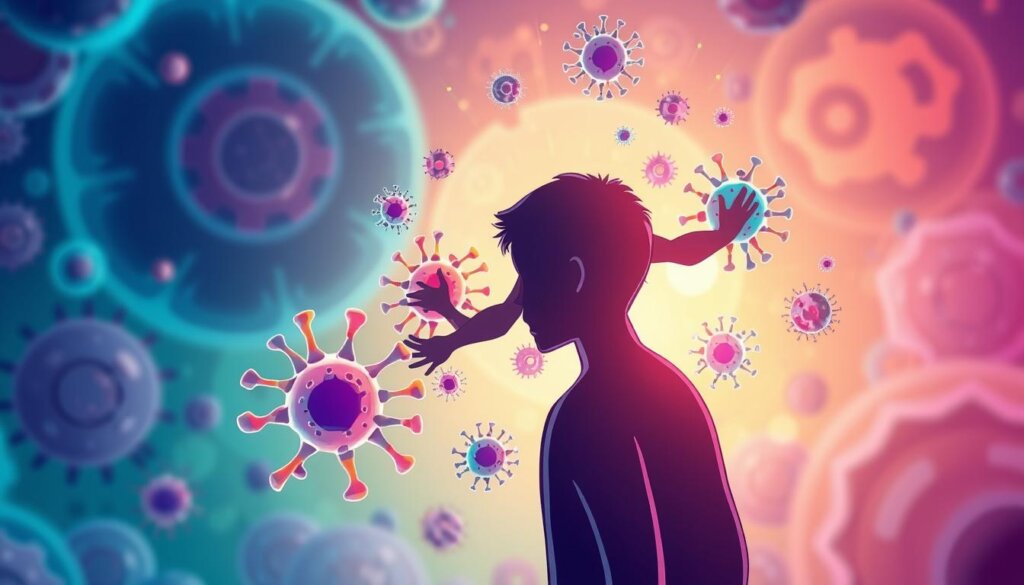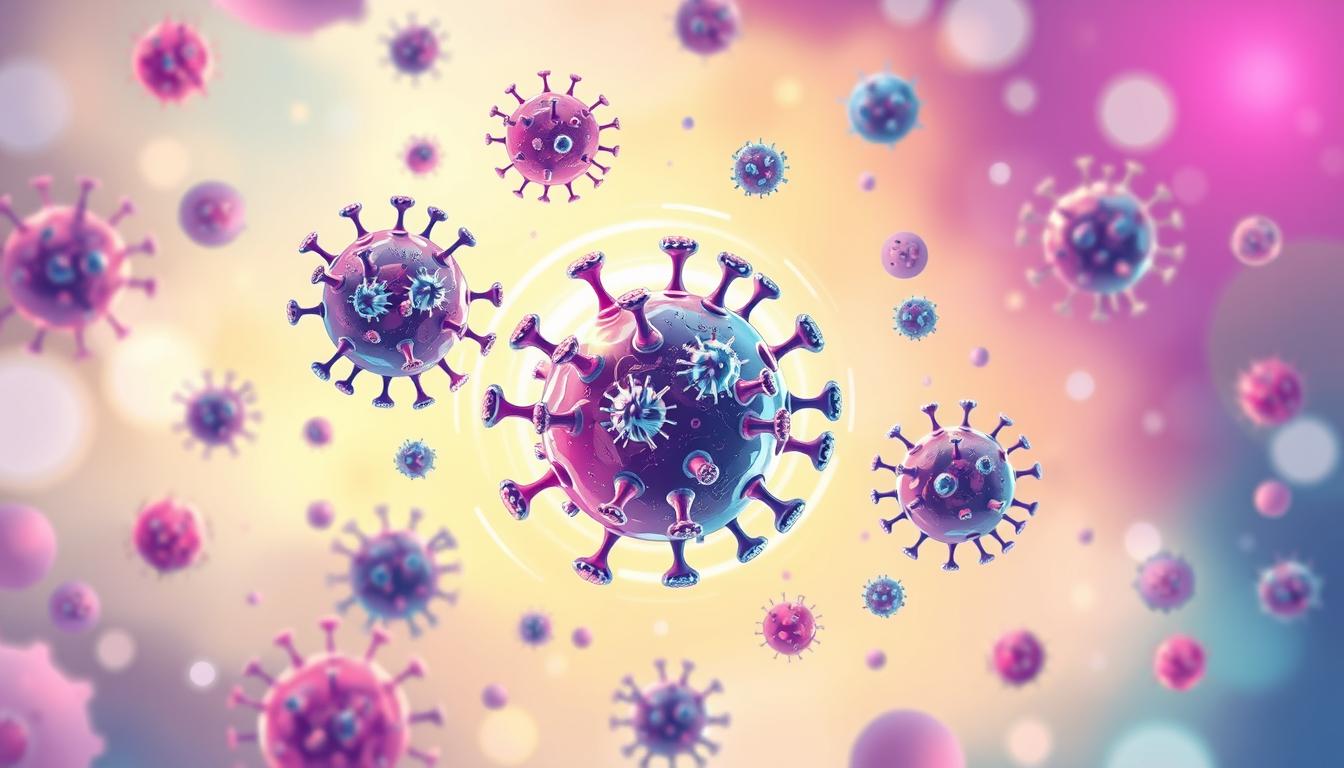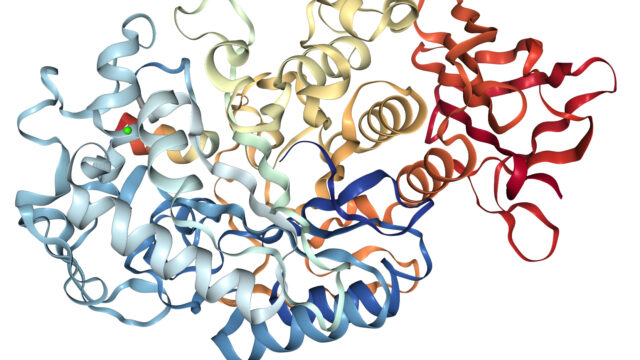FTC disclaimer: This post may contains affiliate links and we will be compensated if you click on a link and make a purchase.
Imagine a world where your immune system fights cancer. This is now possible thanks to cancer immunotherapy. It has greatly increased survival rates for cancer patients, helping some live longer. In 2014, Science named it the “Scientific Breakthrough of the Year.”
Cancer immunotherapy lets your body fight cancer on its own. It uses your immune system to target and destroy cancer cells. This treatment is changing cancer care, giving hope to patients and their families. It includes treatments like checkpoint inhibitors, adoptive cell therapy, and monoclonal antibodies.
Key Takeaways
- Cancer immunotherapy harnesses the power of the immune system to fight cancer.
- Immunotherapy has shown significant improvements in survival rates for cancer patients.
- Checkpoint inhibitors and cellular immunotherapy are two main types of immunotherapy used to treat cancer.
- Monoclonal antibody drugs and CAR T-cell therapy are important components of cancer immunotherapy.
- Immunotherapy is often used in combination with other cancer treatments like chemotherapy or targeted therapy.
What is Cancer Immunotherapy?
The immune system is key in fighting cancer. But sometimes, cancer cells hide from the immune system. Cancer immunotherapy uses your body’s Immune Cells to find and fight Cancer Cells.
Understanding Immunotherapy
Immunotherapy boosts your immune system’s fight against cancer. It can be used alone or with other treatments. The goal is to help your immune system find and kill cancer cells.
How Immunotherapy Works Against Cancer
Immunotherapy targets proteins that control the immune response. Cancer cells use these proteins to hide from the immune system. Immunotherapy drugs, called Immune Checkpoint Inhibitors, block these proteins, allowing the immune system to attack cancer cells.
Another method, Adoptive Cell Therapy, uses your own Tumor-Infiltrating Lymphocytes (TILs). These immune cells are taken, grown, and then given back to you. They can then fight cancer more effectively.
Immunotherapy is promising for many cancers, like melanoma and lung cancer. But not everyone will respond, and it can have side effects.

As research goes on, cancer immunotherapy could change how we treat cancer.
Types of Cancer Immunotherapy
Cancer immunotherapy is a new way to fight cancer. It uses the body’s immune system to attack cancer cells, and this method is changing how we treat cancer.
Immune Checkpoint Inhibitors
Immune checkpoint inhibitors block proteins that keep the immune system in check. This allows T cells to fight cancer better, greatly improving survival rates for melanoma patients.
Adoptive Cell Therapy (T-cell transfer Therapy)
Adoptive cell therapy includes CAR T-cell therapy and TIL therapy. It removes, changes, and puts back immune cells to fight cancer. It has shown great results in treating lymphoma, leukemia, and some solid tumors like glioblastoma.
Monoclonal Antibodies
Monoclonal antibodies target cancer cells. The FDA has approved over a dozen for different cancers.
Cancer Vaccines
Cancer vaccines help the immune system find and attack cancer cells. Preventive vaccines like the HPV vaccine have lowered cervical cancer rates. Therapeutic vaccines, like sipuleucel-T for prostate cancer, have also helped patients live longer.
Immune System Modulators
Immune system modulators, like cytokines, boost the immune system’s fight against cancer. IL-2 aldesleukin (Proleukin) is approved for advanced kidney cancer and melanoma. IFN-alfa treats various cancers like leukemia and melanoma. Immunomodulators like Imiquimod and Lenalidomide also help start immune reactions against cancer.

Cancers Treated with Cancer Immunotherapy
Immunotherapy has changed how we fight cancer, giving hope to many. It works on many cancers, like bladder and prostate cancer. This method uses the body’s own defenses to fight the disease.
Many cancer types can be treated with immunotherapy drugs. These include bladder, breast, and prostate cancers. It’s a new way to fight cancer, better than old methods like surgery and chemo.
Studies show immunotherapy works well, with some patients getting long-term remission. The first cancer immunotherapy was approved in 2011. Now, over 70 drugs are being tested.
New treatments like immune checkpoint inhibitors are helping fight cancer. They work on melanoma, lung, and bladder cancers. Researchers keep finding new ways to use immunotherapy, helping more people.

The future of cancer treatment looks bright. With more research, we’ll see even better treatments. This gives hope to those fighting cancer.
Side Effects of Cancer Immunotherapy
Cancer immunotherapy is a promising treatment but can have side effects. When the immune system attacks healthy cells, it causes Immune-Related Side Effects. These include Inflammation, Fatigue, Skin Rashes, and Autoimmune Reactions.
Common side effects are skin issues like rash and itchiness. Gastrointestinal problems like diarrhea are also common. Flu-like symptoms, such as fever and muscle aches, can happen too.
Respiratory issues, including coughing, can occur. In some cases, it can cause endocrine disorders like hypothyroidism. Severe side effects include inflammation and neurological problems.
Patients are closely watched by their healthcare team. About 20% of people get an Immune-Related Adverse Effect (irAE). Common side effects include fatigue and itchy rash.
Different treatments can cause different side effects. Monoclonal antibodies can cause flu-like symptoms, and skin reactions and liver issues are common.
It can lead to severe conditions in rare cases. Patients should tell their doctors about any symptoms. This can include adjusting treatment or using medications.
Some studies suggest side effects may mean treatment is working. But more research is needed. Immunotherapy can improve survival rates in many cases.
Other treatments, like Thalidomide, Lenalidomide, and Pomalidomide, can cause side effects. These include drowsiness and low blood cell counts. They can also cause serious blood clots.
Bacillus Calmette-Guérin (BCG) can cause flu-like symptoms. Imiquimod can cause serious skin reactions.

Patients should know about potential side effects. Working closely with their healthcare team is key to managing them.
How Cancer Immunotherapy is Administered
Cancer immunotherapies are given in different ways. Each method is chosen based on the treatment and the patient’s needs. These include intravenous (IV), oral, topical, and intravesical methods.
Intravenous (IV) Administration
Intravenous (IV) treatment is a common way to give cancer immunotherapies. The treatment is injected into a vein, allowing it to spread through the body.
Oral Administration
Some treatments are available in pill or capsule form, which makes it easy for patients to take them by mouth. This is more convenient for many people.
Topical Administration
For early-stage skin cancers, treatments can be applied as creams or ointments. This method targets the cancer right where it is.
Intravesical Administration
For bladder cancer, treatments are put directly into the bladder. This method focuses on cancer cells in the bladder.
The right way to administer cancer immunotherapy depends on the treatment and the type of cancer. Your healthcare team will help you choose the best method.
Like other treatments, immunotherapy can have side effects. These might include skin issues, flu-like symptoms, stomach problems, and joint pain. Your healthcare team will monitor you closely and help manage any side effects.
“Immunotherapy has shown varying success rates in treating different types of cancer.”
Administration Method | Description |
|---|---|
Intravenous (IV) | Injecting the immunotherapy directly into a vein |
Oral | Taking the immunotherapy in pill or capsule form |
Topical | Applying the immunotherapy as a cream or ointment to the skin |
Intravesical | Placing the immunotherapy directly into the bladder |
Knowing about the different ways to give cancer immunotherapy helps patients and doctors. They can find the best method for each person’s needs.
Locations for Receiving Cancer Immunotherapy
Cancer immunotherapy is given in places like doctor’s offices, hospital clinics, or outpatient units in hospitals. You don’t need to stay in the hospital to get it. Where you go depends on your doctor and the treatment place.
The UCSF Cancer Immunotherapy Clinic (CIC) offers top treatments that use your immune system against cancer. They have cancer vaccines, CAR T-cell therapy, and new drugs. UCSF is known for its cancer research and is a top cancer center.
The Mays Cancer Center at UT Health San Antonio MD Anderson gives personalized cancer immunotherapy. They help with both early and advanced cancer, like bladder cancer. Doctors there use immune checkpoint drugs to fight cancer.
Facility | Immunotherapy Services | Accreditations |
|---|---|---|
UCSF Cancer Immunotherapy Clinic (CIC) | Cancer vaccines, CAR T-cell therapy, experimental drugs | National Cancer Institute Comprehensive Cancer Center, American College of Surgeons’ Commission on Cancer (CoC) |
Mays Cancer Center at UT Health San Antonio MD Anderson | Immune checkpoint drugs, personalized immunotherapy for early and advanced stages | National Cancer Institute (NCI)-designated cancer center in Central and South Texas |
These are some places where you can get cancer immunotherapy. The treatment and where you go depend on your cancer and health.
“Cancer immunotherapy is a game-changer in the fight against this disease, and patients now have access to these revolutionary treatments in various outpatient settings across the country.”
Frequency of Cancer Immunotherapy Treatment
The frequency and duration of cancer immunotherapy treatment vary a lot. This depends on the cancer type, the immunotherapy used, and how well the patient responds.
Patients might receive immunotherapy daily, weekly, or monthly. It might also be given in cycles with breaks in between. Doctors monitor patients’ progress to find the best schedule.
In a study at MD Anderson Cancer Center, all patients with locally advanced colorectal cancer had no cancer left after treatment. They got pembrolizumab for up to 6 months before surgery. Also, most patients saw a big drop in tumor size within 24 weeks, with many showing no cancer.
In another trial, NICHE-2, two-thirds of patients with MSI-high or dMMR colorectal cancer had no cancer left after treatment.
Using immune checkpoint inhibitors less often can save a lot of money. A study found it saved $1.1 million and 384 hours for 15 patients over two years.
Treatment Characteristic | Details |
|---|---|
Dosing Frequency | Patients typically receive a dose of immune checkpoint inhibitor every two to three weeks. |
Lifespan Improvement | Melanoma patients now live over five years after immune checkpoint inhibitors, up from less than a year. |
Cost Savings | A patient can stay on immune checkpoint inhibitors for six years for the same drug cost as one year of standard dosing. |
The length and frequency of cancer immunotherapy treatment can change a lot. Doctors work with patients to find the best treatment plan.
Monitoring Response to Cancer Immunotherapy
Patients getting cancer immunotherapy are closely watched by their doctors. They undergo regular physical checks, blood tests, and imaging like Tumor Imaging to help them see how the treatment is working.
Blood tests show how the immune system is doing and levels of important biomarkers. For example, tests for BRCA1, EGFR, or KRAS genes help doctors know the patient’s cancer risk or drug resistance.
Imaging like PET and CT scans help doctors see if tumors are getting smaller or if new ones appear. They use the RECIST method to check how well treatments like immunotherapy are working.
Monitoring Technique | Purpose |
|---|---|
Physical Exams | Check for changes in health and signs of tumor growth or shrinkage. |
Blood Tests | Look at immune system activity, biomarker levels, and treatment response or resistance signs. |
Tumor Imaging | Watch for changes in tumor size, find new lesions, and see how well immunotherapy works. |
Doctors use these checks to see if the treatment is working. If not, they might change the treatment plan. Keeping a close eye on patients is key to giving them the best care.
“The development of immuno-oncology drugs has progressed from early therapies targeting CTLA4 to the next generation, reflecting the dynamic landscape of cancer treatment approaches.”
New research, like liquid biopsies and molecular imaging, helps track treatment response and resistance. Doctors and researchers always look for new ways to predict outcomes and improve cancer treatment.
Current Research in Cancer Immunotherapy
Researchers are working hard to improve cancer immunotherapy and solve its problems. They focus on several key areas, including beating resistance, predicting who will respond, understanding how cancer evades the immune system, and making treatments safer.
Overcoming Resistance
One big challenge is when cancer becomes resistant to treatment. Scientists are looking at ways to beat this. They think combining different treatments might help the immune system fight cancer better.
Predicting Responses
It’s important to know who will get better from immunotherapy. New research is helping us understand how the gut, immune system, and cancer work together. This could lead to better ways to predict who will benefit from certain treatments.
Understanding Evasion of Immune Responses
Cancer cells find ways to avoid the immune system. Researchers are studying these tricks to make treatments more effective and to find ways to stop cancer from hiding from the immune system.
Reducing Side Effects
Immunotherapy is promising but can have tough side effects. Scientists are working to make treatments safer and more effective and are exploring new ways to deliver treatments that are gentler on the body.
Scientists are making big steps forward in cancer treatment by focusing on these areas. These advances could lead to more tailored and effective treatments, which could greatly improve patients’ outcomes.
Immunotherapy Advancement | Key Findings |
|---|---|
Overcoming Resistance | Combining immunotherapies with other treatments to enhance the immune system’s ability to target cancer cells |
Predicting Responses | Exploring the role of gut microbiome, biomarkers, and other factors to identify patients most likely to benefit from immunotherapies |
Understanding Immune Evasion | Deepening the understanding of how cancer cells evade and suppress immune responses, enabling the design of more effective immunotherapies |
Reducing Side Effects | Improving administration and management of immunotherapies to reduce the severity and frequency of adverse reactions |
The ongoing research in these areas is very promising. It could make cancer treatments more effective and safer, leading to better patient outcomes.
Conclusion
Cancer immunotherapy is getting better and offers hope for those looking for new ways to fight cancer. It uses the body’s immune system to attack cancer cells. This could change how we treat cancer forever.
Even though it’s not used as much as old treatments, scientists are working hard to make it better. They’re testing new ways to make it safer and more effective. Already, treatments like sipuleucel-T for prostate cancer and PD-1 antibodies for melanoma have shown great promise.
As research continues, more people might get to try these new treatments. Scientists are learning more about how to make them work better, and they’re excited about the future of fighting cancer with the immune system.
FAQ
What is cancer immunotherapy?
Cancer immunotherapy uses the body’s immune system to fight cancer. It trains the immune system to better find and destroy cancer cells.
How does immunotherapy work against cancer?
The immune system usually fights off abnormal cells, like cancer. But cancer cells can hide from the immune system. Immunotherapy helps the immune system see and attack cancer cells better.
What are the main types of cancer immunotherapy?
Several types of cancer immunotherapy exist. These include immune checkpoint inhibitors, adoptive cell therapy, monoclonal antibodies, cancer vaccines, and immune system modulators.
What types of cancer can be treated with immunotherapy?
Immunotherapy can treat many types of cancer. This includes bladder, breast, colorectal, lymphomas, leukemias, non-small cell lung cancer, melanoma, and prostate cancer.
What are the side effects of cancer immunotherapy?
Immunotherapy can cause side effects. These happen when the immune system attacks healthy cells. Some of the side effects include inflammation, fatigue, skin rashes, and autoimmune reactions.
How is cancer immunotherapy administered?
Immunotherapy can be given in different ways. It can be given through IV injection, orally, topically, or directly into the bladder.
Where do patients receive cancer immunotherapy?
Patients usually get immunotherapy in an outpatient setting. This can be a doctor’s office, clinic, or a hospital unit. They don’t have to stay overnight.
How often is cancer immunotherapy given?
The treatment schedule varies depending on the cancer type, the immunotherapy type, and how the body responds. Treatments can be daily, weekly, monthly, or in cycles with breaks in between.
How is the response to cancer immunotherapy monitored?
Patients are closely watched by their healthcare team. They have regular exams, blood tests, and scans. These check for changes in tumor size and how the body is responding.
What areas are researchers focusing on to improve cancer immunotherapy?
Researchers are working on several areas. They aim to overcome resistance, better predict patient responses, understand how cancer cells evade the immune system and reduce side effects.








